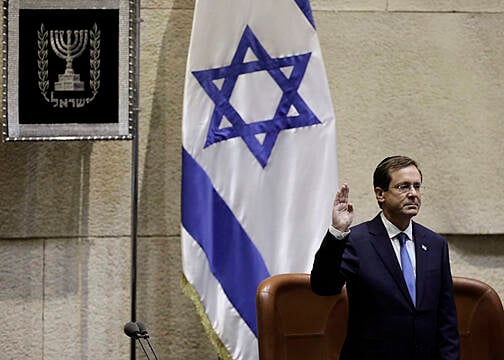Isaac Herzog, member of a prominent Zionist family, took the oath of office on Wednesday and became Israel’s new president.
With one hand on a Bible before the Knesset, Israel’s parliament, Mr Herzog, 60, assumed the largely ceremonial position that is designed to forge national unity and serve as the country’s moral compass.
The parliament chamber was festooned with large bouquets of white lilies for the inauguration.
Military rabbis blew rams’ horns, followed by a performance by a children’s choir.
Mr Herzog, whose father, Chaim, served as Israel’s president in the 1980s, succeeded Reuven Rivlin as Israel’s 11th president and is to hold office for a single seven-year term.
אני מתחייב להיות הנשיא של כולם.
תחי מדינת ישראל! pic.twitter.com/5IJ0FOHZJH— יצחק הרצוג Isaac Herzog (@Isaac_Herzog) July 7, 2021
Chaim Herzog also served as Israel’s ambassador to the United Nations.
The new president’s pedigree includes his grandfather, Yitzhak HaLevi Herzog, who was the country’s first chief rabbi.
His uncle, Abba Eban, served as foreign minister and ambassador to the UN and United States.
“The truth is that I am a little envious of you,” Mr Rivlin said in a letter to Mr Herzog published on Twitter.
“In a short while you will discover what a great and wonderful privilege you have” to be president of all of Israel’s various communities — Jews and Arabs, religious and secular, young and old.”
Mr Herzog was elected to the presidency by the Knesset last month.
He had previously served as head of the Labour Party and head of the opposition in parliament.
After leaving politics in 2018, he served as head of the Jewish Agency, a non-profit organisation that works closely with the Israeli government to promote Jewish immigration to Israel and to serve Jewish communities overseas.

Taking office at a time of deep divisions in Israeli society, Mr Herzog said upon his election that he intends to be “the president of everyone” and work to preserve Israel’s democracy.
While most of the office’s function is to receive foreign dignitaries and other ceremonial roles, the president has the power to grant pardons.
That could become part of the national agenda if former prime minister Benjamin Netanyahu, who is on trial for corruption charges, is ever convicted.
The president is also responsible for selecting a political party leader to form a governing coalition and serve as prime minister after parliamentary elections, a task Mr Rivlin has done five times while in office, most recently after the March 23 parliamentary election.
Mr Herzog’s inauguration comes less than a month after Israel swore in a new government under prime minister Naftali Bennett, who struck a coalition agreement with foreign minister Yair Lapid.
Mr Netanyahu was ousted from office after a 12-year stint as prime minister, the longest in Israel’s history, and now serves as opposition leader.







